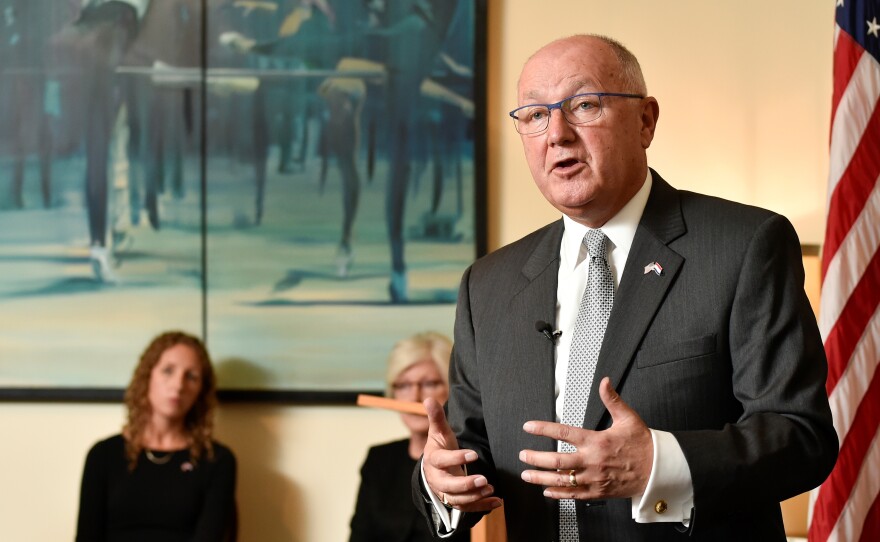A State Department spokesperson on Thursday said anti-Muslim comments made by President Trump's new ambassador to the Netherlands "were not the position of the State Department" — but he also declined to say the comments had been factually inaccurate.
The partial disavowal came a day after Ambassador Pete Hoekstra's first news conference in the Netherlands, in which he was pressed by Dutch reporters to retract the false claims he made in 2015 — when he said the "Islamic movement" was responsible for "no-go zones" and politicians "being burned" in the Netherlands.
"The State Department does not agree with those statements. That is not the language that we would use," the State Department's undersecretary for public diplomacy and public affairs, Steve Goldstein, told reporters in Washington Thursday.
Goldstein was responding to questions about an event in November 2015, when Hoekstra spoke on a panel in Charleston, S.C., that was organized by the conservative David Horowitz Freedom Center. The group describes itself as a "School of Political Warfare" against enemies like the "political left."
Hoekstra's remarks were captured on video:
"The Islamic movement has now gotten to a point where they have put Europe into chaos. Chaos in the Netherlands. There are cars being burned. There are politicians that are being burned. ... With the influx of the Islamic community — and yes, there are no-go zones in the Netherlands. All right? There are no-go zones in France. There are no-go zones. ... So there are no go zones in Britain as well, but they are tearing the Dutch apart politically."
At a tense news conference at The Hague on Wednesday, Hoekstra told reporters he had already "expressed my regrets and my apology for the comments that I made. And I'm not revisiting the issue."
"Are politicians being burned in the Netherlands in the past? Is that something you believe? Yes or no," a reporter asked the U.S. diplomat, in an Associated Press video of the conference.
"I'm not revisiting the issue," Hoekstra said again, adding that he had expressed regret and apology. After multiple reporters asked similar questions about the 2015 statement, Hoekstra eventually stopped responding.
In December, a Dutch news crew asked Hoekstra about his 2015 comments, to which he replied that he "never said that." In a unique move, he later denied his denial of the comments, according to CNN.
Taking up the issue again last month, Hoekstra put out a statement saying, "I made certain remarks in 2015 and regret the exchange during the Nieuwsuur interview. Please accept my apology."
But saying you "regret" or "apologize" for something is not the same as acknowledging a factual error, a point not lost on reporters who pressed Goldstein about Hoekstra's remarks during Thursday's State Department briefing:
QUESTION: Why can't you say right now that those statements were inaccurate? UNDER SECRETARY GOLDSTEIN: Well, I did say that. I said that's not the position of the Department of State. QUESTION: No, that's different. It's different. Not the position of the Department of State is different from those statements are inaccurate. UNDER SECRETARY GOLDSTEIN: I've been very clear that that's not our position. That is not language that we would use, and that's not language you will ever hear me use or Heather use from this podium. ...
Copyright 2018 NPR. To see more, visit http://www.npr.org/.






